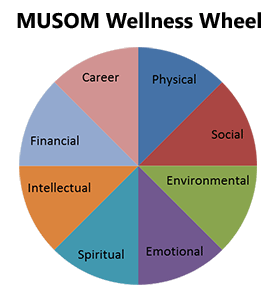The MUSOM Student Wellness Committee was established in December 2010 and charged with identifying the unique challenges medical students face in order to create a culture of self-care by which students maintain well balanced lifestyles.
Members
Class of 2018
Paulina Skaff
Aubrey Fleming
Aladdin Tarakji
Class of 2019
Nicole Lee
Christian Adams
Maggie Blackwood
Saidat Sola-Rufai
Class of 2020
Marji McCoy
Steven McHenry
Lee Mendenhall
Class of 2021
Rachel Wargacki
Madison Crank
Zach Casto
MUSOM Wellness Wheel
Wellness is broken down into eight major categories, as demonstrated by the Wellness Wheel:

PHYSICAL WELLNESS: a perception and expectation of physical health.
- Exercising regularly
- Eating properly
- Getting regular physical check-ups
- Avoiding the use of tobacco or illicit drugs
- Limiting intake of caffeine and alcohol
SPIRITUAL WELLNESS: a positive perception of meaning and purpose in life.
- Spending time defining personal values and ethics and making decisions that complement them
- Spending time alone in personal reflection
- Participating in spiritual activities
- Caring about the welfare of others and acting out of that care
- Being open to cultures and beliefs that are different from your own
SOCIAL WELLNESS: a perception of having support available from family, friends, or co-workers in times of need and a perception of being a valued support provider.
- Interacting easily and without judgment with people of different ages, backgrounds, races, lifestyles
- Contributing time and energy to the community
- Communicating your feelings while being sensitive to others emotions
- Developing and utilizing a good social support network
- Budgeting and balancing your time to include both responsibilities and relaxation
EMOTIONAL WELLNESS: possession of a secure self-identity and a positive sense of self-regard; also the ability to cope with and/or improve unpleasant mood states.
- Keeping a positive attitude
- Being sensitive to your feelings and the feelings of others
- Developing emotional resilience
- Providing constructive and useful feedback to others in a polite manner
- Taking responsibility for your own behavior
- Viewing challenges as opportunities rather than obstacles
- Functioning independently but knowing when you need to ask for help
INTELLECTUAL WELLNESS: the perception of being internally energized by an optimal amount of intellectually stimulating activity.
- Maintaining a sense of academic curiosity
- Welcoming new learning opportunities
- Learning through varied experiences – reading, writing, sharing and exploration
- Finding applications for material learned in the classroom
- Staying current with world affairs/news
- Exposing yourself to new experiences (e.g. arts, theater)
ENVIRONMENTAL WELLNESS: the positive perception of the environment that one works and lives in.
- Working with others to facilitate a positive learning environment
- Being aware of the natural environment in which you live
- Recognizing opportunities that lead you to new skills and acting on those opportunities
- Working to ensure the stability and longevity of our natural resources
- Utilizing available security escort resources to ensure physical safety
FINANCIAL WELLNESS
- Understanding your budget so that you can make good financial choices
- Maintaining an ongoing awareness about your personal level of debt
- Being familiar with debt management solutions and other financial literacy tools by utilizing school resources (e.g., appropriate management of credit cards, loan forgiveness programs)
CAREER WELLNESS
- Understanding yourself – your interests, values, personality, skills and aspirations – and developing a baseline of information and assessment results about yourself
- Exploring a wide spectrum of specialties and identifying the ones which suit you best
- Developing sound decision-making strategies
- Finding satisfaction and worth in your education and chosen career path
History of Activities
Promotion of Yoga as a Wellness Activity: Based on the recommendations of the Wellness Committee, led in this case by Audrey Dean, MS-3, an affiliation was established with a local studio, Brown Dog Yoga. One hundred and fifty yoga passes were purchased by the Office of Student Affairs and provided to interested medical students. This is anticipated to be an annual wellness offering.
Wellness Event Series: The first offering in this Wellness Series was conducted by Katrina Mailloux, founder and owner of Brown Dog Yoga. The specific objectives of this session were (1) Learn breathing and meditation practices that can help you manage anxiety and stress and (2) Experience chair yoga for relaxation and stretching during study breaks.
50 miles in 50 Days: This competition was designed physical activity and has been held annually since 2011. 78 students participated in this kickoff event held February 7, 2011 - April 5, 2011. The contest was repeated in February 27-May 5, 2012 in which 69 students participated. In academic year 2013-2014, 62 students participated in the event.
Fall Festival: This activity wasfirstdesigned by the 2012-2013 Wellness Committee to encourage socialization among students. Festivals have been held in the fall of 2012 and 2013.
Personal Counseling Services: The committee endorsed the contractual arrangements to be provided by Cabell Counseling Center. The contract began in July 2011 and was renewed in July 2012 and July 2013.
Handbook of Student Services: The committee recommended that a Student Handbook be created to assist students in finding services. It was created and placed on the Student Affairs web page August 2011.
MUSOM Plus Ones: The committee identified the need to re-establish the partner support group. The first meeting was held in January 2012. About nine events were scheduled through May 3, 2012. The Plus Ones also hosted a dinner at Orientation for the Class of 2016. For academic year 2013-2014, the Plus Ones hosted a welcome event on 9/24/13
MUSOM Wellness Model: After a review of wellness programs at other medical schools, a Wellness Model was reviewed by the committee and a final model was adopted in academic year 2011-2012. It will be reviewed annually.
Ideas are welcome. Contact any of your representatives.

